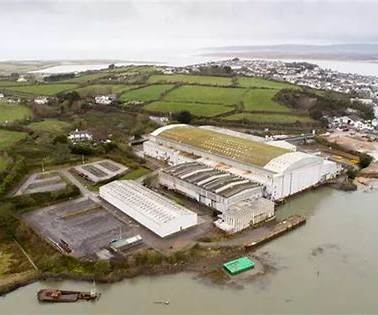Employer, Career

Navantia UK at Appledore Shipyard: Forging the Future of North Devon’s Maritime Economy
November 12th, 2025

Article by Dan Martin | November 6th, 2025
From Hinkley Point C to the new Agratas Gigafactory and the Celtic Sea, the South West is shaping the UK’s engineering future. Dan Martin explores the innovation, investment and infrastructure transforming the region.
From Hinkley Point C to the new Agratas Gigafactory and the Celtic Sea, the South West is shaping the UK’s engineering future. Dan Martin explores the innovation, investment and infrastructure transforming the region.
A region built on engineering excellence
When people talk about the UK’s engineering powerhouses, they often jump to the Midlands or the North East. But those of us working closely with South West businesses know a quiet transformation has been unfolding here for years.
From Bristol’s aerospace cluster to Devon’s marine innovation and Cornwall’s renewable energy frontier, this region is redefining what British engineering looks like: sustainable, highly skilled and proudly regional.
As someone who works daily with engineering employers through Cathedral Appointments, I’ve seen first-hand how this shift is creating new opportunities for companies and professionals alike.
Big projects, long-term vision
Let’s start with the headlines. Hinkley Point C, one of the largest construction projects in Europe, has been a magnet for engineers, project managers and specialist contractors. Beyond Somerset, its ripple effect is enormous. Supply-chain businesses across the South West are scaling up, upskilling, and innovating to meet demand.
Another landmark development is taking shape just down the road. The Agratas Gigafactory in Somerset, part of Tata Group’s £4 billion investment in battery manufacturing, is set to become one of Europe’s largest battery production sites. It represents a major leap forward in the UK’s push for electrification and a huge opportunity for engineers in construction, automation, robotics and sustainability.
Further west, the Celtic Sea floating offshore wind developments promise to turn Cornwall and South Wales into a renewable energy hub. The potential here is staggering: thousands of engineering and technical roles supporting the UK’s net-zero targets while anchoring sustainable growth in coastal communities.
And in Plymouth, the Freeport initiative is breathing new life into marine and defence engineering. By combining tax incentives with cutting-edge research through the University of Plymouth, it is creating fertile ground for advanced manufacturing and maritime technology.
Together, these projects are more than infrastructure. They are a statement of confidence in the region’s talent and capability.
Innovation ecosystems taking shape
One of the most encouraging trends is how universities, research centres and businesses are collaborating. The University of Exeter’s Centre for Future Clean Mobility, for example, is developing zero-emission powertrains for marine and off-highway vehicles. Meanwhile, Bristol’s National Composites Centre continues to pioneer lightweight materials that feed directly into aerospace and defence supply chains.
At Exeter Science Park, start-ups and established engineering firms share space, ideas and networks. The result is an innovation corridor stretching from Bristol to Plymouth that rivals anything elsewhere in the UK.
For employers, this means access to R&D, talent and funding without having to relocate. For engineers, it means career opportunities that combine high-tech work with the lifestyle benefits that make the South West so appealing.
A sustainable mindset
Another defining feature of the South West’s engineering growth is its focus on sustainability. Whether it is clean energy, circular manufacturing or low-carbon transport, businesses here tend to take the long view.
That is partly cultural. The geography of the region keeps us close to the natural environment. But it is also strategic. Investors and supply chains increasingly demand strong environmental and social credentials, and South West firms are responding proactively.
Engineering is no longer just about delivering projects. It is about delivering responsibly. The fact that so many of the region’s major developments are linked to renewables or decarbonisation speaks volumes.
Challenges worth addressing
Of course, opportunity does not mean ease. The region faces well-known challenges: infrastructure bottlenecks, an ageing workforce, and competition for skilled engineers.
Businesses tell me that while they love the South West’s quality of life, recruitment and retention can still be tricky, especially when competing with London salaries or remote-first roles. That is where regional collaboration becomes crucial. By promoting our combined strengths and investing in training pipelines, we can keep more of our home-grown talent here.
Encouragingly, many firms are already stepping up. They are offering apprenticeships, working with local colleges and creating inclusive workplaces that appeal to the next generation of engineers.
Looking ahead
Over the next decade, the South West will continue to be shaped by engineering ambition. Hydrogen energy, battery technology and data-driven design are likely to join renewables and advanced manufacturing as regional specialisms.
As these industries converge, the line between traditional and tech-enabled engineering will blur, and the South West is perfectly placed to lead that evolution. The mix of academic research, coastal infrastructure and entrepreneurial spirit gives us a unique edge.
What excites me most is that this growth feels rooted in community. Whether it is a family-owned precision engineering firm in Mid Devon or a multinational R&D base in Bristol, there is a shared sense that the work being done here matters to the region, to the UK economy and to future generations.
Final thoughts
The South West does not need to chase anyone else’s industrial blueprint. We already have one built on innovation, collaboration and respect for our environment.
If we keep nurturing our people and investing in the projects that set us apart, the region’s engineering future looks brighter than ever.
Article by Dan Martin
November 6th, 2025
Employer, Career

November 12th, 2025
Employer, Career

November 6th, 2025
Employer, Career

October 2nd, 2025
This site uses cookies to improve your user experience. Cookie Policy